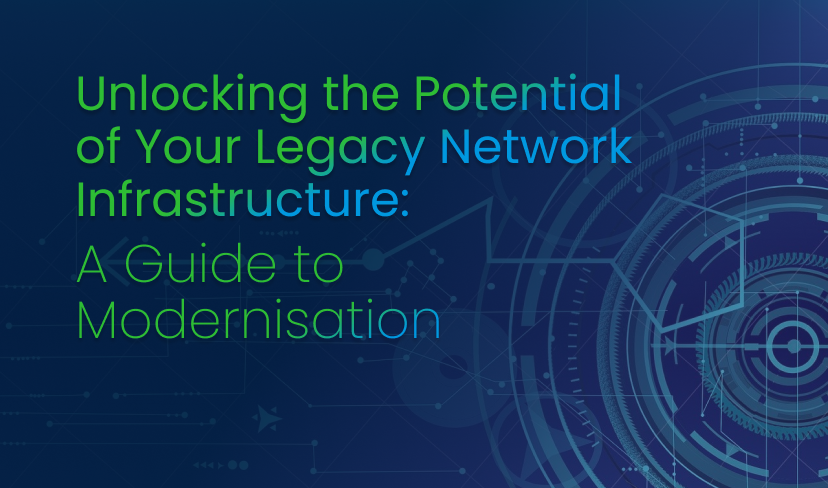As technology rapidly evolves, legacy network infrastructure can become a bottleneck for businesses striving to stay competitive in the digital age. To meet the demands of modern applications, cloud services, and remote work environments, it is crucial to modernise your network infrastructure.
Understanding Legacy Network Infrastructure
Legacy network infrastructure refers to the traditional hardware and software components that have been in use for an extended period. While they may have served organisations well in the past, they can hinder progress due to limited capabilities and inefficiencies.
Challenges with Legacy Network Infrastructure
Some common challenges associated with network infrastructure include outdated technology, lack of scalability, security vulnerabilities, and high maintenance costs. These limitations can impede business growth and hinder innovation.
The Advantages of Modernisation
Modernising your network infrastructure comes with a host of advantages. By upgrading to advanced technologies, businesses can experience improved performance, enhanced security, and increased flexibility, allowing them to adapt to changing market dynamics.
Improving Performance and Reliability
Modern network infrastructure leverages cutting-edge technologies to deliver faster and more reliable connections. This improvement in performance enables seamless access to critical resources and applications.
Enhancing Security and Compliance
Security is a top concern for businesses today. Modern network solutions incorporate robust security features, protecting data and preventing unauthorised access. Compliance with industry regulations becomes easier with enhanced security measures.
Scalability and Flexibility
Scalability is essential for businesses experiencing growth. Modern infrastructures can effortlessly scale to accommodate increasing demands, ensuring a smooth expansion process.
Embracing Infrastructure as a Service (IaaS)
Infrastructure as a Service (IaaS) is a cloud computing model that allows businesses to outsource their infrastructure needs. By shifting from on-premises infrastructure to IaaS, organisations can reduce costs and focus on core business objectives.
Network as a Service (NaaS): A Paradigm Shift
Network as a Service (NaaS) is a revolutionary approach to network management. It enables businesses to deploy, manage, and optimise networks without the complexity of owning physical hardware.
The Key Steps to Modernise Your Network Infrastructure
Comprehensive Network Assessment
Before embarking on the modernisation journey, conduct a thorough assessment of your existing infrastructure. Identify areas that need improvement and prioritise your modernisation efforts accordingly.
Formulating a Customised Modernisation Strategy
Every organisation’s requirements are unique. Tailor a modernisation strategy that aligns with your business goals and addresses specific challenges you face.
Implementing the Modernisation Plan
Execute the modernisation plan systematically, ensuring minimal disruption to daily operations. Collaborate with experienced professionals to deploy new technologies effectively.
Regular Performance Evaluation
After implementing the changes, consistently evaluate the performance of your modernised infrastructure. Make adjustments as needed to ensure optimal efficiency.
Avoiding Common Pitfalls in Network Modernisation
While modernisation is crucial, it’s essential to be aware of potential challenges and pitfalls.
Data Migration Challenges
Transferring data from legacy systems to modern infrastructure can be complex. Prioritise data integrity and security during migration.
Legacy Application Compatibility
Ensure that legacy applications are compatible with the modernised network. Consider updates or replacements if necessary.
Training and Employee Adoption
Train your workforce to leverage the new infrastructure effectively. Employee adoption plays a significant role in successful modernization.
The Future of Network Infrastructure
As technology continues to evolve, the future of network infrastructure looks promising.
Advancements in Software-Defined Networking (SDN)
SDN enables organisations to manage their networks more efficiently through software-based controllers, enhancing network flexibility.
The Role of Artificial Intelligence (AI) in Network Management
AI-driven network management allows for proactive monitoring and predictive analysis, enhancing network reliability.
Conclusion: Unlock the Potential of Your Legacy Network Infrastructure
Modernising your legacy infrastructure is a critical step towards staying competitive in today’s dynamic business landscape. Embrace Infrastructure as a Service (IaaS) and Network as a Service (NaaS) to enhance performance, security, and scalability. Contact our experts at Transputec to kickstart your network modernisation journey.
ensuring a rapid return to normal operations.




